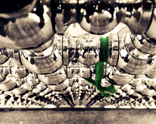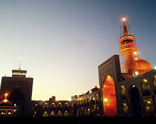The Imam, peace be on him, would supplicate with this supplication during his personal prayer (qunut): “The flight is toward You, O Possessor of presence and desire. The desire is for You, O He through whom is pride.
You, O Allah, can see the whisperings of souls, observe the movements of hearts, and know of hidden secrets without affectation and tyranny; and You, O Allah, can see all things; but toward Your clemency they have shown audacity, disobedience, arrogance, and obstinacy; (and You can see) what Your friends suffer out of effacing the tracks of the truth, obliterating its marks, the increase of ill-deeds, the continuation of their people toward them, the appearance of falsehood, the generality of unjust and mutual consent on that (regarding) dealings and sundries; it (unjust) has become familiar and become as one of the obligatory and legislated things
O Allah, hasten toward him whom you help is successful, and him whom You support is not afraid of the blame of anyone, and severely punish the unjust; be neither merciful nor affectionate to them.
“O Allah, so rush toward them!
“O Allah, be quick toward them!
“O Allah, grant them not a respite!
“O Allah, punish them early in the morning and at midday, in the early dawn and by night, when sleeping, in the forenoon while playing; scheme against them when scheming; and take them by surprise while safe!
“O Allah, scatter them; disperse their helpers; decrease their aids; defeat their soldiers; reduce their limits; uproot their glory; and weaken their determinations!
“O Allah, grant us their sides; make us possess their districts; change their blessings; replace with peace our caution of them and their aggression (against us); make use control them thoroughly! O Allah, so do not withhold Your punishment, which if occur among people, evil shall then be the morning of the warned one!1”
This supplications gives an account of the vengeance of the Imam, peace be on him, on the oppressive and tyrannical rulers of his time who drowned Islamic world in hardships and tragedies and forced the Muslims to perform what they hated. This is one of the political supplications which narrate the conditions of that time.
His Supplication during the Prayer for giving Thanks (salat al-Shukr)
Sulayman b. Jaafar has narrated: “We visited Imam al-Rida, peace be on him, while he was performing the prayer for giving thanks (salat al-Shukr). He lengthened his prostration in prayer. Then he raised his head and we asked him about his long prostration. He told us that he prayed with the following supplication. He urged us to (supplicate) with it. Then he ordered us to write it, and we wrote it.” The supplication is as follows:
“O Allah, curse those who altered Your religion, changed Your favor, accused Your Messenger (may Allah bless him and his Household), opposed Your religion, turned away from Your way, were ungrateful for Your boons, returned Your words to You, disdained Your Messenger, killed the (grand) son of Your Prophet, distorted Your Book, denied Your signs, sat in the assembly which was not appropriate for them, and which the people carried on the shoulders of the Household of Mohammed!
“O Allah, curse them with curses following each other, gather them and their followers blue-eyed in the Hell-fire!
“O Allah, we seek nearness to You through cursing them and renouncing them in this world and the next!
“O Allah, curse those who killed the Commander of the faithful and al-Hussein b. ‘Ali and Fatima, daughter of Allah’s Messenger, may Allah bless him and his Household.
“O Allah, increase them in chastisement to chastisement, humiliation to humiliation, abasement to abasement, and disgrace to disgrace!
“O Allah, drive them away to the Fire with violence and return them to Your painful chastisement with a return!
“O Allah, gather them and their followers in the Hell-fire in group! O Allah, divide their gathering; scatter their affair; make their words disagree with each other; disperse their unity; curse their Imams; kill their leaders, their masters, and their eldest ones; curse their heads; break their banars; spread terror among them; and leave not any dweller of them!
“O Allah, curse Abo Jahl and al-Walid with curses following one another! O Allah curse them with a curse through which curse every angel brought nigh, every prophet sent out, and every believer whose heart You examine for faith! O Allah curse them with a curse from which the inhabitants of the Fire seek refuge, and which does not come into anyone’s mind! O Allah, curse them in Your hidden secret and Your manifest openness, chastise them with a chastisement in the ordination, and let their partners be their followers and their lovers! Verily You hear supplication!”2
This supplication shows that the Imam was indignant with some Caliphs who controlled without any right the general authority of the country, and hence they brought about woe and destruction to Islamic world through preventing the pure Household of the Prophet from undertaking authority while they were the most learned of others in the affairs and precepts of Islam. This great supplication is one of the political supplications.
The Imam uses Supplication as Weapon
Yet another quality of the Imam’s spiritual life is that he practiced supplication as a weapon through praying to Allah and referring to Him in all his affairs, for he found in it (supplication) a spiritual enjoyment which none of the enjoyments of life equaled it. We will mention his statements concerning the importance of supplication before we present some of his supplications.
Supplication is the Weapon of the Prophets
The Imam urged his companions to supplicate Allah and said to them: “Adhere to the weapon of the prophets!”
“What is the weapon of the prophets?” he was asked.
“Supplication,” he replied.3
Concealing Supplication
The Imam advised his companions to conceal supplication, and that man should supplicate his Lord secretly, that none may know of him. He, peace be on him, has said:
“A servant’s secret supplication equals seventy open supplications.4”
Slowness in Answering Supplication
The Imam spoke about the reasons for the slowness in responding to supplication. Ahmed b. Mohammed b. Abo Nasr has narrated: [ I (i.e. Ahmed) said to Abo al-Hassan (i.e. Imam al-Rida): May I be your ransom, I have asked a need from Allah since so-and-so year, and something have entered my heart because of slowness (in answering it). He, peace be on him, declared: “O Ahmed, beware of that Satan makes a way against you in order to make you despair (of Allah’s mercy). Abo Ja‘far (i.e. Imam al-Baqir), the blessings of Allah be upon him, said: ‘The believer asks his need from Allah, the Great and Almighty, but He delays responding to him out of love for his voice and listening to his wailing.’”
Then he said: “By Allah, what Allah, the Great and Almighty, sets behind the believers in this world is better than what He sets before them therein. What a thing is the world? Abo Jaafar would say: ‘The believer’s supplication during ease should be similar to that of his during hardship. He should not flag (in supplicating) when he is given. Therefore, be not tired of supplication, for it is of great position with Allah, the Great and Almighty. Adhere to patience, seeking the lawful, and tightening your bonds of kin. Beware of showing open enmity toward men, for we, the members of the House, tighten ties with him who cut us and treat kindly him who mistreats us, hence we, by Allah, see through that the good final result. If the possessor of a favor (strives for gathering) sample funds, then he is not satisfied with anything. When favors become abundant, the Muslim is in danger because of the duties in*****bent upon him and the trial through them.’”
“Tell me, if I say some words to you, will you trust them?” asked Imam al-Rida.
“May I be your ransom, if I do not trust you, then whom shall I trust?” retorted Ahmed, “You are the proof of Allah over His creatures.”
“Therefore, have more confidence in Allah, for you will meet him, replied the Imam, “don’t Allah, the Great and Almighty, say: And when My servants ask you concerning me, then surely I am very near; I answer the prayer of the suppliant when he calls on me5; don’t He say: do not despair of the mercy of Allah6; and don’t He say: and Allah promises you forgiveness from Him and bounty.7 Therefore, have confidence in Allah more than you have in other than Him. Place nothing in your soul except good, and you will be forgiven.8”
The Imam has mentioned the causes which hold back supplication and delay response and, in addition, he has urged (Muslims) to follow the morals of the members of the House (ahl al-Bayt), peace be on them.
His Amulet (hirz)
The Imam, peace be on him, would use this holy supplication as weapon: “In the Name of Allah, the Merciful, the Compassionate. O He to whom there is neither likeness nor similitude! You are Allah!
There is no god but you; nor is there a creator except You! You perish the creatures and You remain! You are clement toward him who disobeys You! And Your good pleasure is in forgiveness!9”
He also clung to this great supplication: “I have submitted, O my Protector, to you; I have submitted my own soul to You; I have entrusted the whole affairs of mine to You! I am Your servant, son of Your servant. So hide me in Your cover from the evil from among Your creatures, protect me from every harm and evil through Your kindness, and spare me the evil of every possessor of evil through Your power!
“O Allah, I seek protection in You from him who schemes against me or desires ill for me! Close the eyes of the oppressive from me, for You are my helper! There is no god but You, O Most Merciful of the merciful and Lord of the worlds! I ask you to be sufficient against harm, (to give me) well-being, recovery, help against the enemies, and success for what You love and accept, O Our Lord! O Lord of the worlds! O All-compeller of the heavens and earth! O Lord of Mohammed and his good, pure Household! Your blessings be upon all of them!10”
The Imam, peace be on him, submitted himself and all his affairs to the One, the Subducer who has power over all things. He clung to the above-mentioned supplication, that Allah might turn away from him the trickery of aggressors and oppression of wrongdoers.
Some of his Supplications
Some holy supplications have been reported from Imam al-Rida, peace be on him. They are as follows:
1. The following is his supplication in seeking security and faith: “O He who gives me evidence for Himself and humiliates my heart through certainty in Him, I ask from You security and faith in this world and the next!”11
This supplication, though short, contains a proof of the Oneness of Allah; the proof is that Allah makes His creatures profess His existence through the wonders of this universe.
2. He, peace be on him, would supplicate with this great supplication: “O Allah, give me guidance; make me steadfast toward it; muster me according to it; make me safe with the safety of him upon whom there is neither fear nor sorrow nor impatience; You are worthy of reverential fear and worthy to forgive!12”
3. He taught the following holy supplication to his companion and student, Musa b. Bukayr. He said to him: “Memorize what I write to you. Supplicate with it during every hardship of which you are afraid.” The supplication is as follows: “In the Name of Allah, the Most Gracious, the Most Merciful. O Allah, my many sins have made me lose face before You, prevented me from being worthy of Your mercy, and kept me away from deserving Your forgiveness! I have adhered to Your boons and clung to supplicating You, for You have promised those who are like me in acting extravagantly (against their own souls), making errors, and despairing of Your mercy through Your words: Say: O My servants who have acted extravagantly against their own souls, do not despair of the mercy of Allah; surly Allah forgives the faults altogether; surely He is the Forgiving, the Merciful.13 You have warned those who despair of Your mercy and said: And who despairs of the mercy of his Lord but the erring ones.14 Then You have summoned us through Your mercy to supplicate You, thus You have said: Call upon me, I will answer you; surely those who are too proud for My mercy shall soon enter hell abased.15
“O my Lord, hopelessness has covered me, and despair of Your mercy has wrapped me! O my Lord, You have promised to reward him who has good opinion in You and to punish him who has bad opinion in You! O Allah, my eye has been seized by good opinion of You in releasing my neck from the Fire, covering my slips, releasing (me) from my stumble! O Allah, Your words, which have neither alteration nor change, are true: (Remember) the day when We will call every people with their Imam.16 That is the Day of Resurrection when the trumpet shall be blown and what is in the graves shall be raised. I believe, witness, confess, do not deny, do not renege, conceal, announce, manifest, and hide that You are Allah, there is no god but You, One with no partner with You, that Mohammed is Your servant and messenger, may Allah bless him and his Family, and that ‘Ali, the Commander of the faithful, master of the testamentary trustees, inheritor of knowledge of the prophets, emblem of religion, destroyer of the hypocrites, the fighter against the Renegades (Mariqin), my Imam, my proof, my handle, my path, my guide, and my argument. I do not trust my deeds though pure; nor do I see that they will save me though righteous but through (showing) friendship to him, following his example, acknowledging his great virtues, accepting from those who delivered them, and submitting to those who narrated them. I confess that his testamentary trustees from among his grandsons are Imams, arguments, guides, lamps, guideposts, lighthouses, masters, and pious. I believe in their secret, their openness, their outward, their inward, their present, their absent, their living, and their dead. In that there is neither doubt nor suspicion nor change when You turn away (from that).
“O Allah, summon me on the day of my mustering and my resurrecting through their Imamate, and save me, O My Protector, from the heat of the Fires through them, and supply me with the repose of the Gardens! Surely, if You release me from the Fire, I will be one of the achievers. O Allah, I rose in the morning of this day of mine (while) I have neither confidence nor hope nor asylum nor place of flight nor shelter except those through whom I seek access to You, seeking nearness to Your Messenger Mohammed, may Allah bless him and his Family, then ‘Ali, the Commander of the faithful, al-Zahraa’, the mistress of the women of the worlds, al-Hassan, al-Hussein, and the one after them who will pave the way for the hidden proof from among his children, hoped for the community after him.
“O Allah, make them in this day and after it my fortress against detested things and my stronghold against fears; save me through them from every enemy, tyrant, oppressor, sinner, the evil of what I know, what I deny, what has hidden from me, what I see, and the evil of every crawling creature that You have taken by the forelock! Surely You are on a straight path.
“O Allah, through my seeking access through them to You, seeking nearness to You through showing love for them, fortifying myself with their Imamate, open for me the doors to Your provision; spread upon me Your mercy; make Your creatures love me; turn me aside from their detest and their enmity! Verily You are powerful over everything.
“O Allah, there is reward for everyone (who) seek access (through them to You); there is right for all the possessors of intercession, hence by him whom You have appointed as Your friend and placed ahead my request, I ask You to make me recognize the blessing of this day of mine, this month of mine, and this year of mine!
“O Allah, they are my place of flight and my help during my hardship, my ease, my well-being, my tribulation, my sleep, my wakefulness, my departure, my residence, my difficulty, my facility, my openness, my secret, my morning, my evening, my movement, my habitation, my secret, and my publicity! O Allah, through them, disappoint me not of Your favor; cut not my hope from Your mercy; disappoint me not of Your repose; tempt me not with the closure of the doors to provisions and of the ways to them; open for me an easy opening from You; appoint for me a way out from every hardship and a road for every plenty! Surely, You are the Most Merciful of the merciful. May Allah bless Mohammed and his pure Household! Amen, Lord of the world!17”
This supplication gives an account of the firm clinging of the Imam to Allah, the Exalted, and his absolute obedience to Him. Also it gives an account of the outstanding merits of the members of the House (ahl al-Bayt), peace be on him, who are the emblems of religion and gatekeepers of the wisdom of the Master of messengers.
4. The Imam, peace be on him, would recite this supplication for seeking provision and plentiful livelihood. He would recite it after each obligatory prayer. It is as follows: “O He Who possesses the needs of the askers and knows the minds of those who are silent! There is a present hearing and ready response to every request from You. There is encompassing, inner knowledge of all those silent before you. I ask You by Your truthful promises, Your generous benefits, Your boundless mercy, Your conquering authority, Your everlasting kingdom, Your perfect words, O He whom the obedience of the obedient does not profit nor does the disobedience of the disobedient harm, bless Mohammed and his Household; provide me with some of Your bounty; and give me that through which You provide me with well-being, through Your mercy, O Most Merciful of the merciful!18”
5. This is another example of his holy supplications: “In the name of Allah, the Most Gracious, the Most Merciful. O Allah! O Possessor of comprehensive power, boundless mercy, uninterrupted kindnesses, successive boons, beautiful benefits, and great gifts! O He who created (men) and provided (them) with the means of subsistence, inspired (them) and made (them) utter, originated (them) and made laws (for them), is exalted and high, ordained and did well, formed and did excellently, advanced an argument and delivered (it), bestowed lavishly upon (men), gave (them) generously, granted (them) and did a favor for (them)! O He who is exalted in mightiness, so swift sight escapes Him, and is close in gentleness, so misgiving thoughts pass Him! O He who is unique in kingdom, so there is no equal for Him in the kingdom of His authority and is One in magnificence, so there is no rival in the invincibility of His station. O He by whose magnificence the subtlest of imaginations are bewildered, and the swiftest of the eyes of mankind fall short of knowing His might! O He who knows the thoughts of the hearts of men and sees the glances of beholder’s eyes! Faces are humble in awe of Him; necks are submissive to His mightiness and majesty; hearts are afraid out of fear of Him; and limbs tremble in terror of Him! O All-apparent! O All-hearing! O All-high! O Exalted! Bless him who makes prayer honorable through calling down blessings upon him; take vengeance on him who has wronged me, made light of me, dismissed the Shiites from my door; let him taste the bitterness of abasement as he has made me taste it; make him outcast among those who commit abominable acts and those who are impure! Praise belongs to Allah! May Allah bless Mohammed and his good, pure Household!19”
This supplication is abound with praising and lauding Allah with the most beautiful kind of laudation. Also it is filled, especially at the end of it, with oppression, harm, and persecutions which were brought about to the Imam by al-Ma’mun, the ‘Abbasid Caliph, who dismissed the Shiites of the Imam, and made light of him. That was when Islamic world admired the position of the Imam and his great personality, and when it came to know that al-Ma’mun had an insignificant character void of morals which were necessary for the office of the caliphate over the Muslims. This supplication demonstrates that the Imam was so displeased with al-Ma’mun that he invoked Allah against him.
6. Yet another example of his holy supplications is following:
“In the name of Allah, the Most Gracious, the Most Merciful. O Allah, to You belongs praise for repelling afflictions which come down, the misfortunes of adversity, calamities, and the continuous rush of the lavishness of favors! To You belongs praise for Your wholesome bestowal and Your praiseworthy trial! To You belongs praise for Your great beneficence, Your dear good, Your easy imposing, and Your repelling difficulties! To You belongs praise for Your making fruitful little gratitude, Your giving abundant reward, Your lessening the weight of heavy sins, Your accepting narrow excuse, Your lifting up burdensome time, Your making easy difficult places, and Your preventing Your decisive command! To You belongs praise for driving away tribulations, abundant favor, repelling fearful things, and abasing the tyrannical! To You belongs praise for little obligation, plentiful reduction, strengthening the weak, and aiding the troubled! To You belongs praise for your abundant disregard, Your lasting bounty, Your taking away the barrenness of land, Your praiseworthy acts, and Your uninterrupted gifts! To You belongs praise for delaying immediate punishment, leaving sudden chastisement, making easy the paths of return (to You), and sending down the rain of clouds! Verily, You are All-gracious, All-Bestower!” This supplication contains a group of phrases which laud and praise Allah, the Exalted, the Creator of the universe and Giver of life.
These are some of the Imam’s supplications which reveal part of his spiritual life, namely he devoted himself to Allah, communicated with Him, and held fast to His cord. With this supplication we will end our speech about some qualities of the Imam’s holy character.
1- Muhajj al-Da'awat, p.73.
2- Muhajj al-Da'awat, p.320.
3- Usul al-Kafi, vol. 2, p. 368.
4- Ibid., p. 476.
5- Qur'an, 2, 186.
6- Ibid., 39, 53.
7- Ibid., 2, 268.
8- Usul al-Kafi, vol. 2, p. 489.
9-Muhajj al-Da'awat, p. 44.
10- Al-Musbah, p. 217.
11- Usul al-Kafi, vol. 2, p. 579.
12- A'yan al-Shi'a, 4/Q2/197.
13- Qur'an, 39, 53.
14- Ibid., 15, 56.
15- Ibid., 40, 60.
16- Ibid., 17, 71.
17- Muhajj al-Da'awat, pp. 315-317.
18- Al-Musbah, p. 168.
19- Ibid., p. 292. Al-Bihar, vol. 12, p. 24.



















